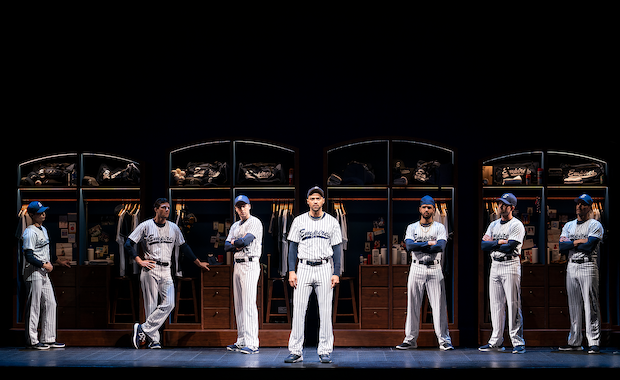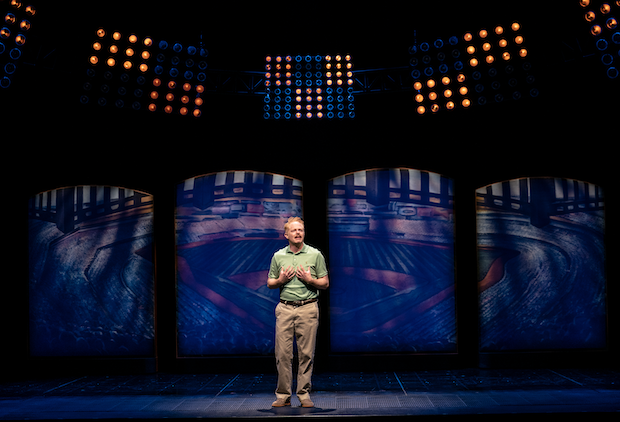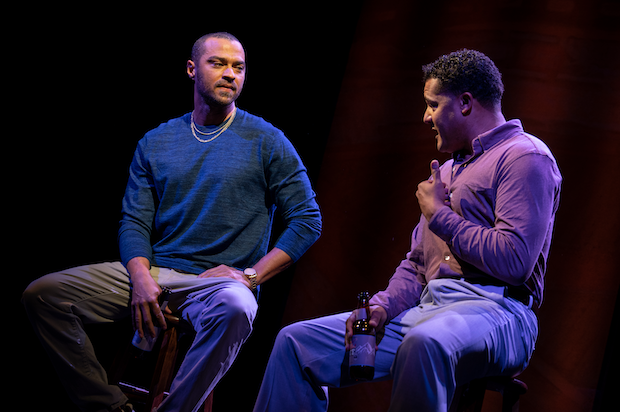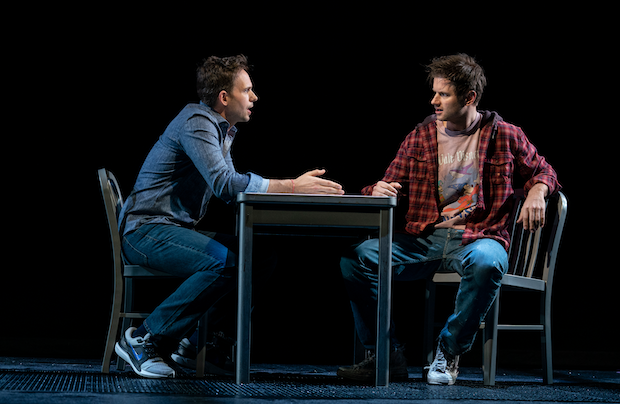Review: Take Me Out, Starring Jesse Williams, Lays Bare the Price of Being Gay in the Major Leagues
The new revival of Richard Greenberg’s Tony-winning play also stars Jesse Tyler Ferguson.
Note: An encore engagement of the production began on October 27, 2022, at the Gerald Schoenfeld Theatre, with a scheduled final performance on February 5, 2023.

(© Joan Marcus)
Twenty years ago, Richard Greenberg's play Take Me Out premiered downtown at the Public Theater before it moved to Broadway, won a Tony for best play, and was shortlisted for a Pulitzer. Second Stage's new revival, now running at the Helen Hayes Theater, was scheduled to open when Covid shut the world down, but its opening right now feels like great timing. The wait was worth it.
Part of that has to do with the fact that at this moment a lot of us are feeling the need for comedy. Not that Take Me Out is that (the play does drift somewhat clumsily into the realm of tragedy), but it certainly has that, and in this production, it comes in the form of Jesse Tyler Ferguson. Despite the nonstop tittering about the show's full-frontal male nudity (it has that too), Ferguson's performance is the real reason to see Take Me Out.

(© Joan Marcus)
Fortunately, director Scott Ellis has given the Modern Family star full rein to do his thing, and he does so to the delirious max. Ferguson plays a gay financial manager named Mason Marzac who has become absolutely enthralled with baseball after a famous, handsome player named Darren Lemming (portrayed with frustratingly charming arrogance by Jesse Williams) comes out publicly as gay. Darren has no social agenda, and he doesn't want to be anyone's spokesman or a role model for any community. He's coming out because he's a big, rich, untouchable star athlete with self-described godlike attributes — and that means he can.
Ferguson and Williams's comic chemistry provides much-needed emollient in a play that delves into some rough topics. Predictably, Darren's fellow players on the Empires team (their uniforms, designed by Linda Cho, suggest Yankees colors) react to his coming-out in a variety of ways: unqualified acceptance from Kippy (Patrick J. Adams, who also narrates), confusion from Jason (Tyler Lansing Weaks), latent attraction from Toddy (Carl Lundstedt), and homophobic taunting from Martinez (Hiram Delgado) and Rodriguez (Eduardo Ramos). Julian Cihi gives an understated yet powerful performance as Takeshi, a Japanese pitcher whose own isolation from the team is manifested by his inability to speak English. Team manager Skipper (Ken Marks) tries to be diplomatic about Darren's news, unlike white pitcher Shane Mungitt (Michael Oberholtzer), whose aggressively offensive comments about Darren's race (he is Black) and sexuality result in Shane's suspension and set in motion a series of tragic events.

(© Joan Marcus)
It's those events that steer the play into odd territory — "the Kafkaesque portion of the evening" as Kippy calls it. Brandon J. Dirden, in an impressive, no-nonsense performance, plays Davey Battle, one of Darren's friends who plays for another team (in both senses). He's the play's avatar for the brand of Christianity that supports the spiritual lives of many baseball players and keeps homosexuality out, or at least tightly suppressed within.
The oddness arises when Greenberg turns the dramatic screw too forcefully in Act 2, following a vicious standoff between Darren and Davey, and makes Davey's tragic fate the cause of Darren's humbling self-awareness in an unbelievable interrogation scene. Here we see Greenberg try hard to make Darren a flawed protagonist out of a Greek tragedy, but that's more than a play like this can shoulder. To his credit, Oberholtzer, in a breathtaking tour de force, rescues the scene from those lofty aspirations and gives it a solid knock out of the ballpark.
Speaking of ballparks, David Rockwell's set, Kenneth Possner's lighting (with miniature stadium fixtures), and Bray Poor's crisp bat-and-ball-cracking sound design make us feel like we're in one, or at least adjacent to one, and by that I mean in the locker room and showers. Yes, in a couple of scenes the team appears in the buff under streaming showerheads. Is the nudity gratuitous, or is it there to suggest how vulnerable these players are when they don't have a uniform to hide behind? Whatever you make of it, expect to have your phone secured in a small pouch (which you can take back to your seat with you) to remove any temptation to snap a picture — not that you would do that.

(© Joan Marcus)
But there's more to take away from Take Me Out than the memory of chiseled men standing naked in a row. Besides addressing America's persistent racist and homophobic backwardness (Shane is the representative of that), the play reminds us, significantly, that there is still no active Major League Baseball player who has publicly come out as gay, or queer, or bi. In the 1970s outfielder Glenn Burke told his teammates that he was gay, but he kept his sexuality hidden from the public until he retired, as did Billy Bean in the late '90s. But how far have we come in the past two decades when in Florida, the state where half of MLB teams go for spring training, it's no longer lawful for teachers to discuss sexual orientation with some students? If anything, some Americans seem to be trying to lock LGBTQ people back in the closet with a deadbolt.
It may take 20 years and another revival to find out whether anyone from the MLB will have what it takes to bust down the door the way Carl Nassib did for the NFL last year. Even as it raises these issues, Take Me Out lets us take a breather with a character who is not a baseball player, but an ordinary, lonely guy who happens to be gay and by chance discovers a love for America's favorite pastime. Ferguson looks like he's having a lot of fun playing him, and his performance translates into a great time at the theater — something we could all use right now.









